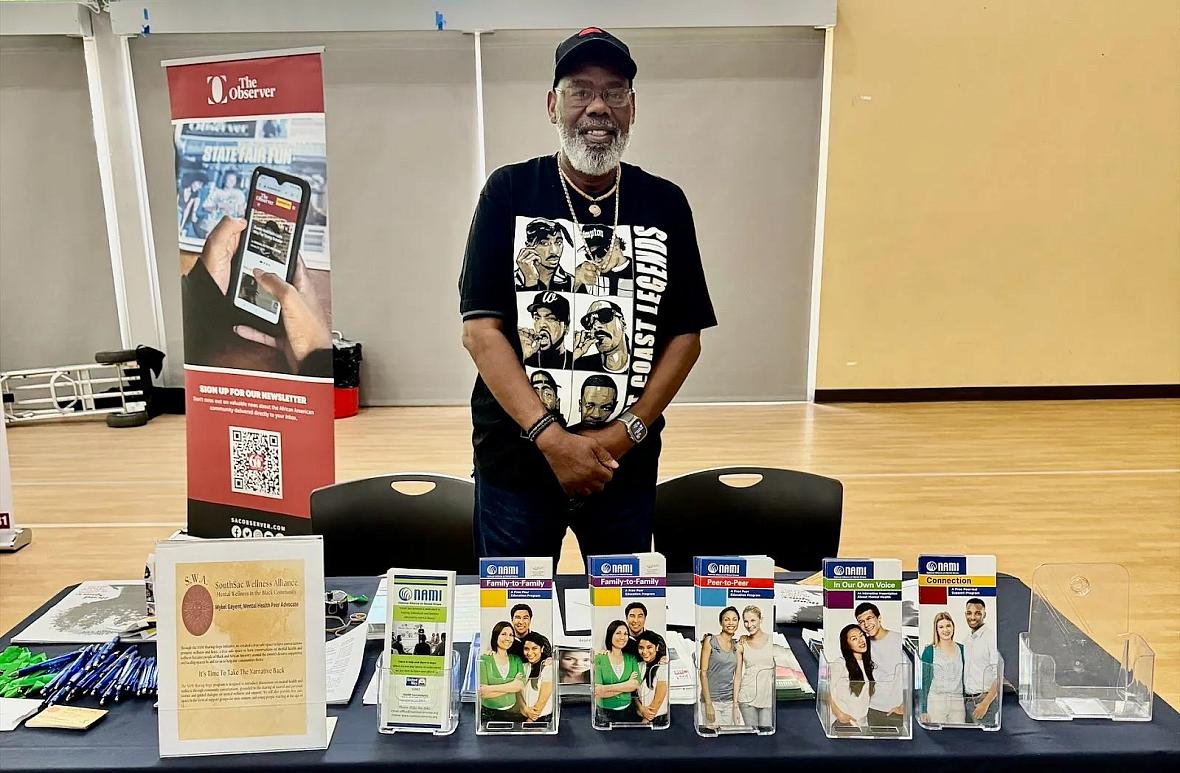Senior Moments: Advocate Mykel Gayent Raises Mental Health Awareness, Battles Black Community Stigma
The story was co-published with The Sacramento Observer as part of the 2024 Ethnic Media Collaborative, Healing California.

Mental health awareness is personal for Mykel Gayent, who shares his struggles and triumphs to motivate others to seek help and resources. Mark Freeman, OBSERVER
A familiar face at local mental health awareness events, Mykel Gayent comes with a table full of valuable information and resources.
Gayent’s commitment to raising awareness goes beyond pamphlet placement. He’s navigating his own challenges and has dedicated his time and energy to helping others do the same.
“I work at it every day,” says Gayent, 68. “I do certain things to make me feel better. Sometimes it works, sometimes it doesn’t. But every day is a new challenge.”
Gayent works with the local chapter of the National Alliance on Mental Illness as an outreach coordinator.
“They have a program called Sharing Hope, which is basically about having a conversation, community conversations, in the Black community, on how to attain wellness.
“The thing is to get the word out. We’re letting people know that it’s OK not to be OK,” Gayent says.
According to the National Institute on Minority Health and Health Disparities, African Americans are 20% more likely to have serious psychological distress than whites. Less than half of Americans with a mental disorder get treatment and African Americans are half as likely as whites to do so.
Gayent also is a peer support specialist/advocate with the Sacramento County Mental Health Board. He is holding space and making sure the community is connected. Many of the resources are ones he encountered in his mental health journey.
“I use mental health professionals, peers and family members all together,” he says.
Past participants in his sessions have included Dr. Flojaune Cofer, the local epidemiologist running to become Sacramento mayor; life coach Adele James; Chris Coon, who works with youth as a spoken word educator; and Safe Black Space Community Healing Circles co-founder Dr. Kristee Haggins.
On The Rise
Gayent is happy to see young people seeking help and other outlets for expressing themselves.
“They’re more interested in mental health. … I just try to encourage them to keep that up,” Gayent says.
Gaining young people’s trust goes a long way toward getting them to open up about their feelings and experiences.
“I use my story a lot,” Gayent says. “I’m using my story and letting them know how I came out of the ashes like a phoenix.”
Gayent was diagnosed with post-traumatic stress disorder a little more than a decade ago. The PTSD was linked to both his time in the military and several traumatic events in his youth, commonly referred to as adverse childhood experiences, or ACEs. According to the National Institute of Mental Health, about 4% of children under age 18 are exposed to some form of trauma that leads to post-traumatic stress disorder.
“I didn’t learn that until after I got my diagnosis because there were things that I went through as a young child that I wouldn’t wish on anyone,” he says. “It took me 57 years to get to the point where I knew what was going on with me.”
He credits NAMI and Veterans Affairs for “getting him squared away.”
“On the first of September, I celebrated 11 years of mental health. Eleven years of my mental health journey and trying to get better.”
Gayent got further clarity through sobriety.
“I had what they call SUD, substance use disorder. Everything that I was dealing with, even cigarettes, I overcame in three days in rehab.”
The area senior went cold turkey, he says, giving up substances that weren’t serving him, such as alcohol and a “few other things.”
“It was like I finally got tired of things. I knew that if I didn’t do something, and I’ve got a family that looks up to me and I wanted to make sure that their last memories of their father, grandfather, uncle, is a good one,” he says. “I want to leave a legacy of someone working in the community, trying to help others. If I can help with one person a day or one person a week, I’m successful.”
A lot of his work is breaking through the stigma of mental illness in the Black community.
“My generation, we’re the ones that grew up with the stigma. We’re the ones that were told that we don’t talk about things, we push it under the rug,” he says. “The word ‘stigma’ meant nothing to me, even after I got my diagnosis, so now I want to help eradicate the stigma. And I think the younger generations are going to help.”
Gayent started his own organization, the SouthSac Wellness Alliance, in April. He’s awaiting nonprofit status.
Approaching 70, Gayent would like to see more seniors, Black men particularly, focused on their mental and physical health.
“That’s what I want, for people to go out and get help. I know a lot of brothers that are not as old as me and they’re suffering.”
EDITOR’s NOTE: This Sensational Seniors article is part of OBSERVER Senior Staff Writer Genoa Barrow’s series, “Senior Moments: Aging While Black.” The series is being supported by the USC Annenberg Center for Health Journalism and is part of “Healing California,” a yearlong reporting Ethnic Media Collaborative venture with print, online and broadcast outlets across California. The OBSERVER is among the collaborative’s inaugural participants.

